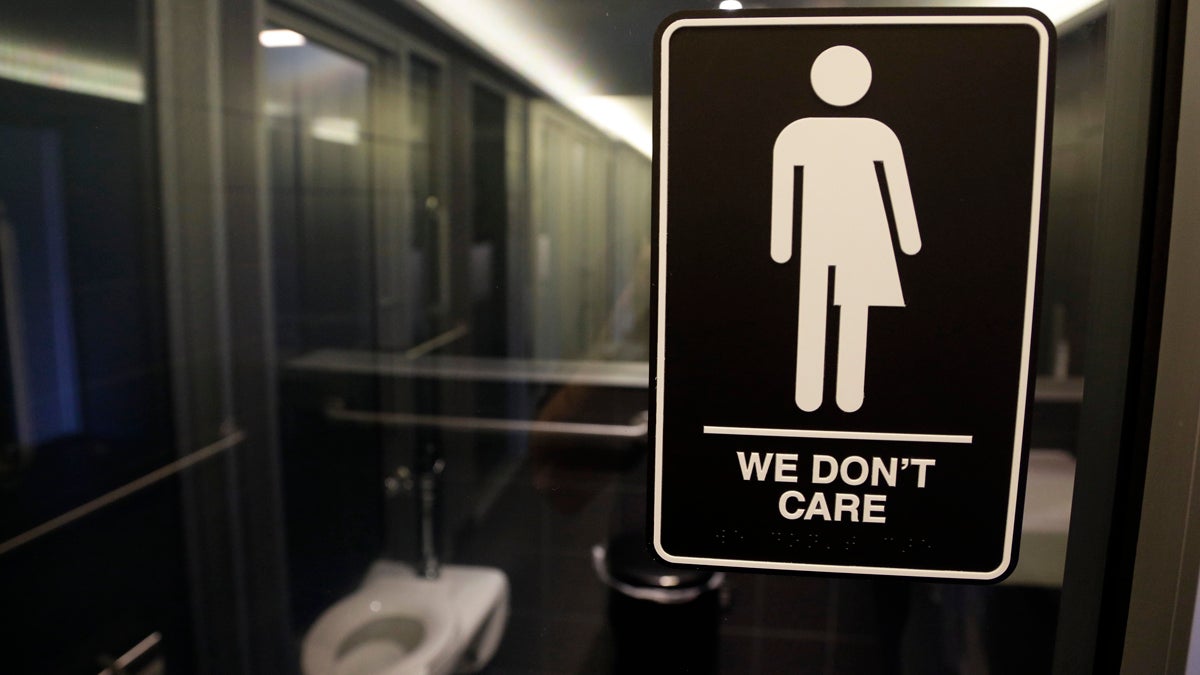Pa. lawmakers rail against ‘unconstitutional’ transgender bathroom rule in letter to Obama

In this photo taken Thursday, May 12, 2016, signage is seen outside a restroom at 21c Museum Hotel in Durham, N.C. North Carolina is in a legal battle over a state law that requires transgender people to use the public restroom matching the sex on their birth certificate. The ADA-compliant bathroom signs were designed by artist Peregrine Honig. (Gerry Broome/AP Photo)
Ninety-seven Republican state representatives in Pennsylvania — including several from the Philadelphia region — have signed off on a letter to President Barack Obama, calling the new federal directive to make public schools transgender-inclusive “unconstitutional” and an “extreme outrage.”
Led by state Rep. Daryl Metcalfe, R-Butler, lawmakers argue in their letter that the new federal guideline “sacrifices … fundamental privacy rights,” endangers young children and usurps the lawmaking powers of Congress.
“Plainly, this directive will allow men to go into legally sex-separated bathrooms with young girls,” it states. “The parents of these young girls are rightly concerned about your policy and its implications for their daughters’ safety.”
Transgender rights advocates call that argument a “red herring,” not borne out by an actual uptick in predatory behavior in places that have had transgender-inclusive bathroom policies.
The letter ends with a request to rescind the policy.
DV.load(“https://www.documentcloud.org/documents/2839187-Pa-Rs-to-POTUS-Title-IX-re-Dear-Colleague.js”, {
width: 600,
height: 600,
sidebar: false,
text: false,
container: “#DV-viewer-2839187-Pa-Rs-to-POTUS-Title-IX-re-Dear-Colleague”
});
Pa-Rs-to-POTUS-Title-IX-re-Dear-Colleague (PDF)
Pa-Rs-to-POTUS-Title-IX-re-Dear-Colleague (Text)
It also cites a federal court case, Johnston v. University of Pittsburgh Com. Sys. of Higher Education, which ended in a settlement, as having already resolved the legal questions around this issue in Pennsylvania.
In that case, a transgender student at the University of Pittsburgh at Johnstown named Seamus Johnston sued the school after it barred him from using the men’s locker room and restroom. The school later changed its policy to allow transgender students to use single-sex spaces based on their gender identities.
Metcalfe’s office forwarded a request for comment to the lawmaker, who did not respond.
Jim Buckheit, executive director of the Pennsylvania Association of School Administrators, said he had not heard much blowback from school district adminstrators.
“It has been something that school administrators have been dealing with for quite some time,” he said. “It’s not something new.”
Some school districts in Southeastern Pennsylvania — including Lower Merion, Great Valley and Springfield Township — had already adopted or were working on their own transgender inclusion policies when the federal directive came.
However, local school boards that were not already looking at the issue may chafe at federal intervention, according to Buckheit.
“It’s more controversial because it came from the federal government than I think it otherwise would have been,” he said.
Only one school district — in Allegheny County — has come out against the mandate so far. Last Friday, the Obama Administration released guidelines in the form of a letter, threatening to restrict federal funds if public schools failed to create a safe and nondiscriminatory environment for transgender students.
That letter calls for schools to honor the gender that students identify as, not necessarily the gender assigned to them on their birth certificates. That means using transgender students’ preferred pronouns on official documents and allowing students to use single-sex spaces — such as bathrooms and locker rooms — based on their gender identity.
WHYY is your source for fact-based, in-depth journalism and information. As a nonprofit organization, we rely on financial support from readers like you. Please give today.

